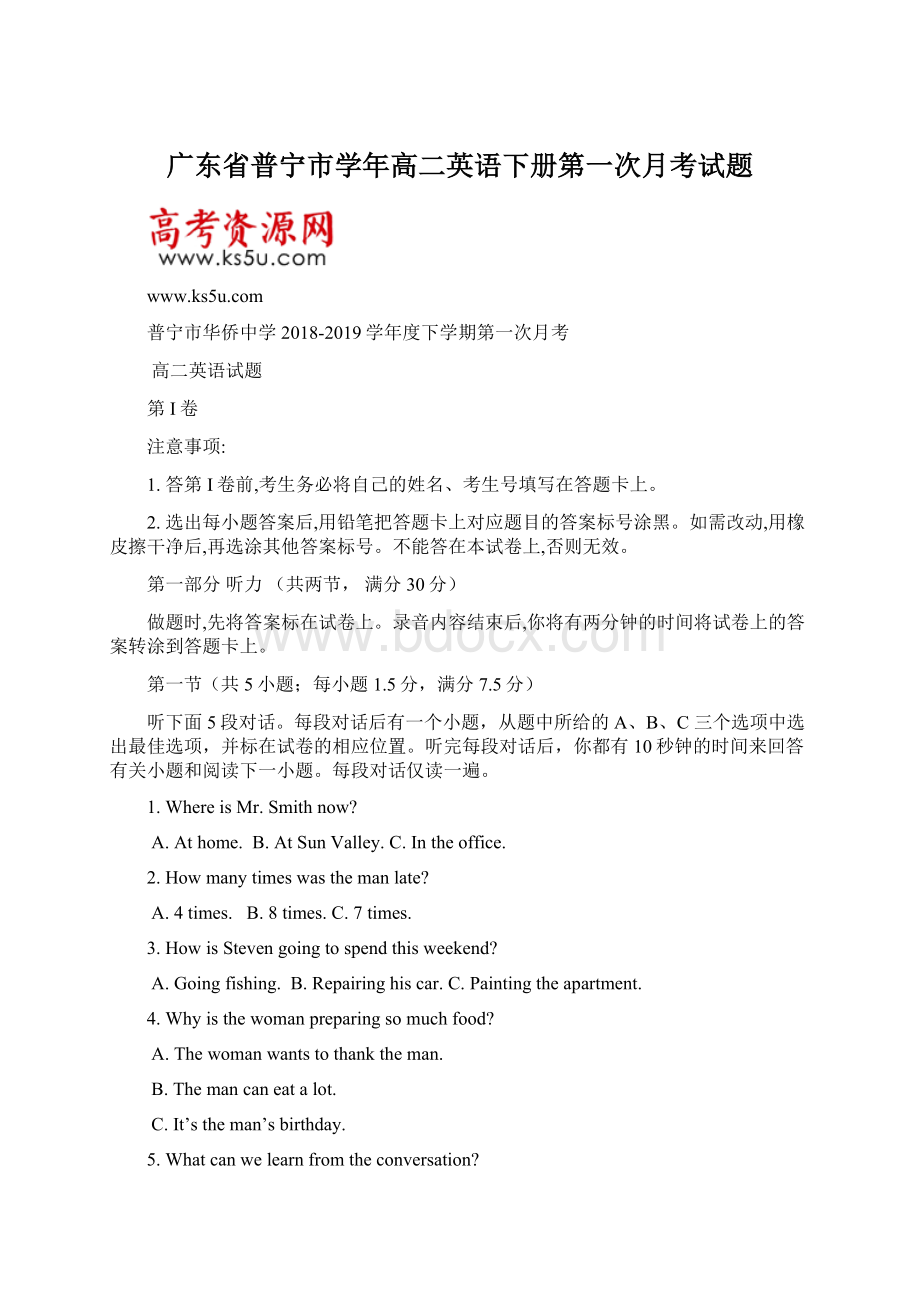广东省普宁市学年高二英语下册第一次月考试题Word文档下载推荐.docx
《广东省普宁市学年高二英语下册第一次月考试题Word文档下载推荐.docx》由会员分享,可在线阅读,更多相关《广东省普宁市学年高二英语下册第一次月考试题Word文档下载推荐.docx(14页珍藏版)》请在冰豆网上搜索。

听完每段对话后,你都有10秒钟的时间来回答有关小题和阅读下一小题。
每段对话仅读一遍。
1.WhereisMr.Smithnow?
A.Athome.
B.AtSunValley.C.Intheoffice.
2.Howmanytimeswasthemanlate?
A.4times.
B.8times.C.7times.
3.HowisStevengoingtospendthisweekend?
A.Goingfishing.
B.Repairinghiscar.C.Paintingtheapartment.
4.Whyisthewomanpreparingsomuchfood?
A.Thewomanwantstothanktheman.
B.Themancaneatalot.
C.It’stheman’sbirthday.
5.Whatcanwelearnfromtheconversation?
A.Theyareneighbors.
B.Theyarebothstudents.
C.Theyarefromthesamecountry.
第二节(共15小题;
每小题1.5分,满分22.5分)
听下面5段对话或独白。
每段对话或独白后有几个小题,从题中所给的A、B、C三个选项中选出最佳选项,并标在试卷的相应位置。
听每段对话或独白前,你将有时间阅读各个小题,每小题5秒钟;
听完后,各小题将给出5秒钟的作答时间。
每段对话或独白读两遍。
听第6段材料,回答第6、7题。
6.Wherearethespeakers?
A.Inabookshop.B.Inalanguagecenter.C.Inarestaurant.
7.Whatdoestheboythinkoftheclasses?
A.Theyaretoolarge.
B.Theyaretoonoisy.
C.Theyshouldbemuchlarger.
听第7段材料,回答第8、9题。
8.Whyisthemansurprised?
A.Noonehasreadthearticlesaboutanthropology(人类学)
B.Thearticleshewantstoreadhavebeenborrowed.
C.Reservedmaterialscanbetakenoutofthelibrary.
9.Whatcanbeconcludedaboutthearticlesforanthropology311?
A.Theyareoutofprint.
B.Theyarenolongerinshortsupply.
C.Theyareinshortsupply.
听第8段材料,回答第10至12题。
10.What’stherelationshipbetweenthetwospeakers?
A.Clerkandcustomer.B.Wifeandhusband.C.Saleswomanandcustomer.
11.Onwhichfloorwillthemanstay?
A.Onthetenthfloor.B.Onthetwelfthfloor.
C.Onthesecondfloor.
12.Howmuchshouldthemanpayintotal?
A.$215.
B.$645.
C.$750.
听第9段材料,回答第13至16题。
13.Wheredoesthewomanwanttogoforhertrip?
A.ToJordan.
B.ToJapan.
C.ToAngola.
14.Howmanyplanesdoesthewomanthinkflyacrossoceanseveryday?
A.Dozens.
B.Hundreds.C.Thousands.
15.WhatdoesthewomanthinkofQueenElizabethII?
A.Splendid.
B.Fast.
C.Safe.
16.WhydidthewomangototheMississippi?
A.Forastudy.
B.Forabusinesstrip.
C.Forasightseeingtour.
听第10段材料,回答第17至20题。
17.Howdoesthespeakerwanttohavetheclothesseparated?
A.Bykids’andadults’.B.Byman’sandwoman’s.C.Bylightanddarkcolors.
18.Whichofthefollowingneedscleaningthistimeaccordingtothetalk?
A.Thefridge.B.Theoven.
C.Thewashroom.
19.Whenshouldsheleavethehousetopickupthekids?
A.At3:
15.
B.At3:
30.C.At3:
45.
20.Whatwillthespeakerdohimself?
A.Foldtheclothes.
B.Cleanthefreezer.
C.Sortthetoysthrough.
第二部分阅读理解(共两节,满分40分)
第一节(共15小题,每小题2分,共30分)
阅读下列短文,从每题所给的四个选项(A、B,、C和D)中选出最佳选项。
A
SummerSurfCampiscentrallylocatedontheBestWesternseashoreinCocoaBeach&
JupiteratCarlinBeachParkwithaccommodation(住宿)attheHolidayInnExpressinJunoBeach.
SummerSurfCampDates:
●SurfCamp—Session1May27th—30thFamilySurfWeek(AllAges)
●SurfCamp—Session2June2nd—6thFamilySurfWeek(AllAges)
●SurfCamp—Session3June9th—13thTeenWeek(Ages12-17)
●SurfCamp—Session4June16th—20thFamilySurfWeek(AllAges)
●SurfCamp—Session5June23rd—27thAdultsOnly(18andover)
●SurfCamp—Session6June30th—July3rdFamilySurfWeek(AllAges)
●SurfCamp—Session7July7th—11thFamilySurfWeek(AllAges)
●SurfCamp—Session8July14th—18thWomenCamp(18andover)
●SurfCamp—Session9July21st—25thFamilySurfWeek(AllAges)
●SurfCamp—Session10July28th—August1stAdultsOnly(18andover)
★A20%discount(折扣)willbeappliedtothe4-DaySurfCampWeeks.
★Parentsarealwayswelcometosignupandjointheirchildrenduringtheteenweeksurfcampsessions.
SummerSurfCampDetails:
●Usecoupon(优惠券)code:
“CAMP5”atcheckouttogetthe5%discount
★DailyRate:
$125.00/person
★SurfCampRuns:
9:
30am—2:
30pm
●Pleasenote:
Wedon’tsupervise(监督)thecampersafter2:
45pm
ContactUs:
888-672-4887info@
21.SummerSurfCampSession5andSession8aresuitablefor________.
A.Mr.Johnsonandhiswife.B.Acouplewithoutchildren.
C.Mr.Blackandhis19-year-oldson.D.Mrs.Blackandher21-year-olddaughter.
22.TheSmithswhojoinintheSurfCampwiththeir11-year-oldsonareadvisedtogoon________.
A.June10th.B.June23rd.C.July22nd.D.July29th.
23.HowmuchshouldMr.andMrs.BrownpayiftheyjoinintheSurfCampwitha“CAMP5”couponfromJune30thtoJuly3rd?
A.$600.B.$760.C.800.D.950.
B
Dyslexiaisaproblemthatrestrictstheabilitytorecognizewordsandconnectsoundswithletterswhenpeopleread.Peoplewiththislearningdisordermayalsohaveproblemswhentheywrite.Dyslexiaisnotrelatedtoeyesightorintelligence.Theprobleminvolvesareasofthebrainthatprocesslanguage.Brainscientistsarestudyingwhethertheycanpredictwhichyoungchildrenmaystrugglewithreadingtoprovidethemwithearlyhelp.JohnGabrieliattheMassachusettsInstituteofTechnologyisleadingthestudyoffive-year-oldsinabouttwentyschoolsintheBostonarea.
Theystudiedintheschoolswithkindergartens.Andforallthechildrenjoininginthestudy,theygivethemabriefsetofpaper-and-pencilteststolookatwhichchildrenappeartobeatsomeriskforstrugglingtoread.Sofar,fiftyofthemhavebeenexaminedinascanner,aspecialmachine,toshowbrainactivity.Writtentestsarenotalwaysabletoidentifydyslexiaorotherproblems,whilebrainscansmayofferamorescientificwaytoidentifyproblems.Andwithreadingproblems,earlyidentificationisimportant.Whenitcomestohelpingchildrenovercomereadingdifficulties,theyoungerthechild,themoreeffectivetheyare.
Readingproblemsarenotusuallyidentifieduntilachildisinthethirdorfourthgrade.Thelaterchildrenarerecognizedaspoorreaders,thelesstreatmentcanhelp.And,asProfessorGabrielipointsout,poorreadingcanmakeeducationastruggle.Readingiseverything.Evenmathandsciencehavetextbooks.
Whilethechildrenaregiventasksrelatedtoreading,thebrainscansmeasuretheextenttowhichcertainpartsofthebrainbecomeactivewhilethechildrendothework.Thescientistssaytheyarepleasedwithearlyresultsfromthestudy,buthavealongwaytogo.
24.Dyslexiaaffectsthepartofbrainconcerning________.
A.eyesightB.intelligenceC.languageD.emotion
25.Dyslexiaproblemsaremorelikelytobeidentifiedthrough________.
A.speechcontestsB.readingefficiency
C.listeningcomprehensionD.brainscans
26.Accordingtothepassage,whichofthefollowingshasthebesttimetoovercomereadingdifficulties?
A.Tom,aboyinthekindergarten.B.Kate,ahighschoolleaver.
C.Jane,aprimaryschoolstudent.D.Steve,amaninhisthirties.
27.Whatisthepassagemainlyabout?
A.AneffectivewaytoidentityDyslexiaatanearlystage.
B.Alearningdisorderinvolvingone’sintelligence.
C.Dyslexia—aproblemaffectingone’sreadingandwriting.
D.ApossiblesolutiontotheproblemsrelatedtoDyslexia.
C
Zerogravitylookscool.Butwhataboutthethingnoonelikestotalkabout?
Yes,thatisright:
goingtobathroom.Zerogravitymakesthiseverydaytaskquiteachallenge.Astronautshavetobetoilet-trainedalloveragain.
TheApolloastronautsraisedthemselvesofftheseatoftheirchairsandstuckaclearplasticbagtotheirbacksideswithstickystrips.Asecondastronautwatchedcloselytobesurenowastematterescapedtheseal.(Youwouldnotwantthatstufffloatingaroundthecabin!
)Whenthedeedwasdone,theastronautcleanedupwithapieceofplasticattachedtotheinsideofthebag,removedthebag,droppedadisinfectantpillinwiththewastematter,andputthewholething,sealed,intoaspecialcontainer.
DonaldW.Rethke,anengineerforHamiltonStandardSpaceSystems,developedamoreprivatewaytoanswernature’scall:
thespacetoilet.Itissomewhatlikethekindoftoiletonewouldfindoncommercialairplanes---withuniqueadaptationsforzerogravity,ofcourse.Forinstance,ithasthighbarsthatkeeptheastronautfromfloatingofftheseat.
Theastronaut(maleorfemale)defecates(排便)inabagandurinates(排尿)inahose.Solidandliquidwastesarekeptseparatedbecauseatleast85%oftheurineisrecycledand,yes,aftercarefulfiltration,usedfordrinkingandotherpurposes.(Waterisalwaysindemandinspace.)Avacuumsucksthewastematerialsintothetoilet,wherethewasteiscompactedintohamburger-likepattiesforeasystorage.Althoughnotexactlylikeanearthboundvisittothetoilet,itisattheveryleastmuchmoreprivatethanintheearlydaysofspacetravel.
28.Accordingtothefirstparagraph,thelackofthegravitycanturnsomethingassimpleas_______intoamajorchallenge.
A.eatingB.takingbathsC.sleepingD.answeringnature’scall
29.HowdidastronautsusetoiletsystemsintheApollodays?
A.Noneofthewastewasseparatedasitisnow.
B.Solidwastewascompressedandstoredonboard.
C.Thetoiletunitsusedwatertoremovethewastethroughthesystem.
D.Theastronautseachusedtheirownprivaterestroom.
30.Toensuretheuserremainsseated,thetoiletcomesequippedwith_______
A.aplasticbagB.astickystripC.awidehoseD.athighbar
31.Whatcanbeinferredfromthefactthatmostoftheastronauts’urineisrecycled?
A.Therecycledwate